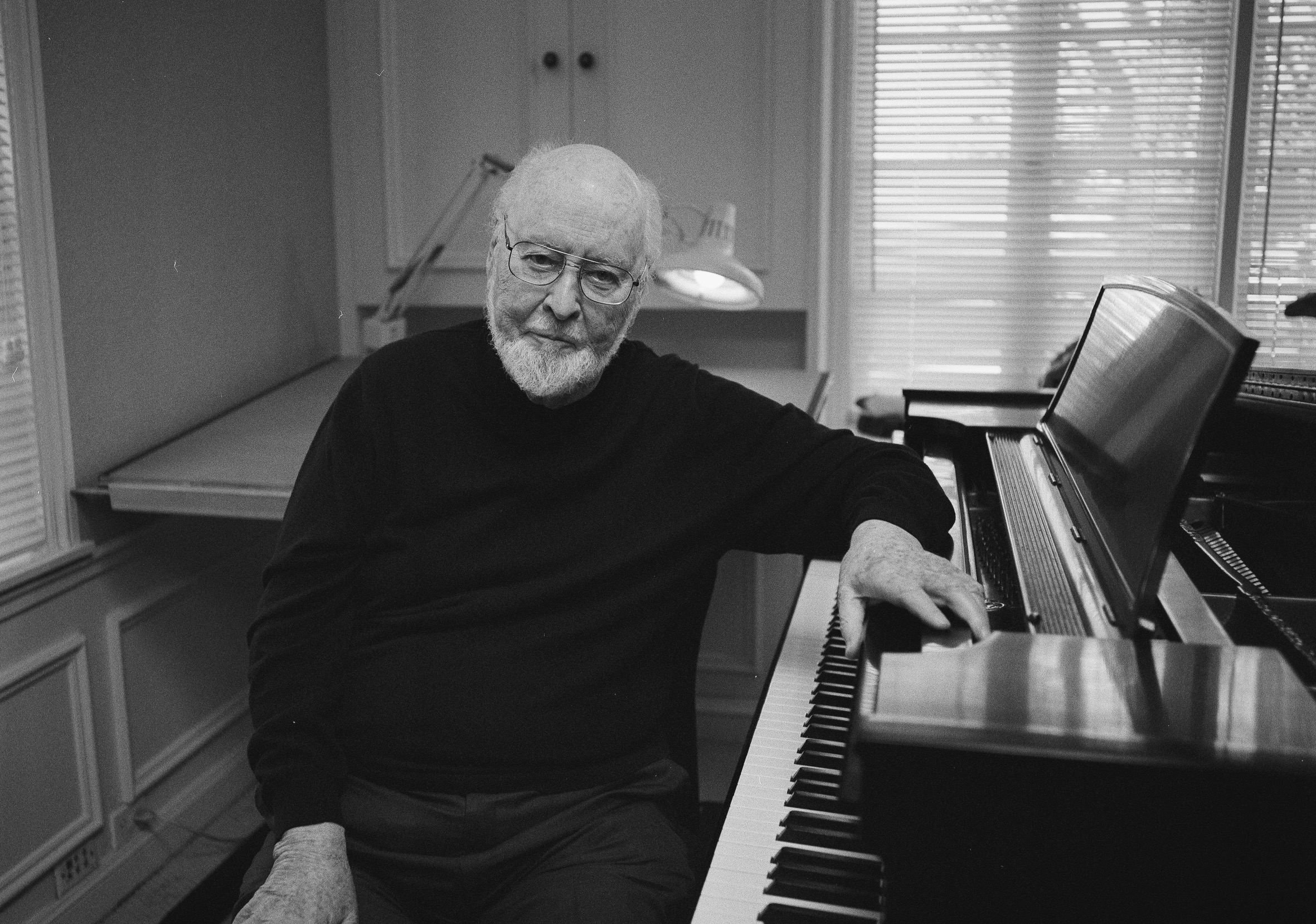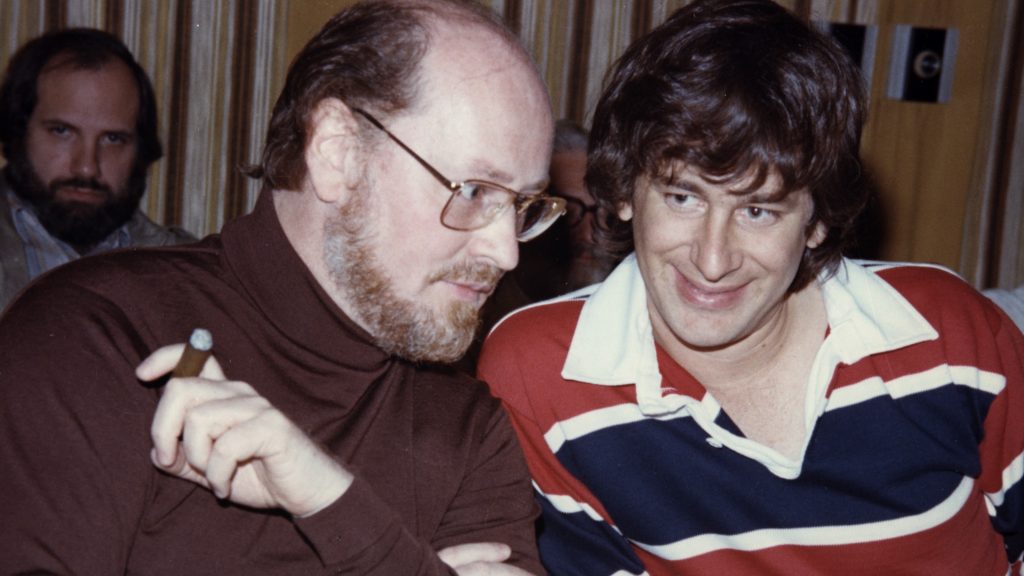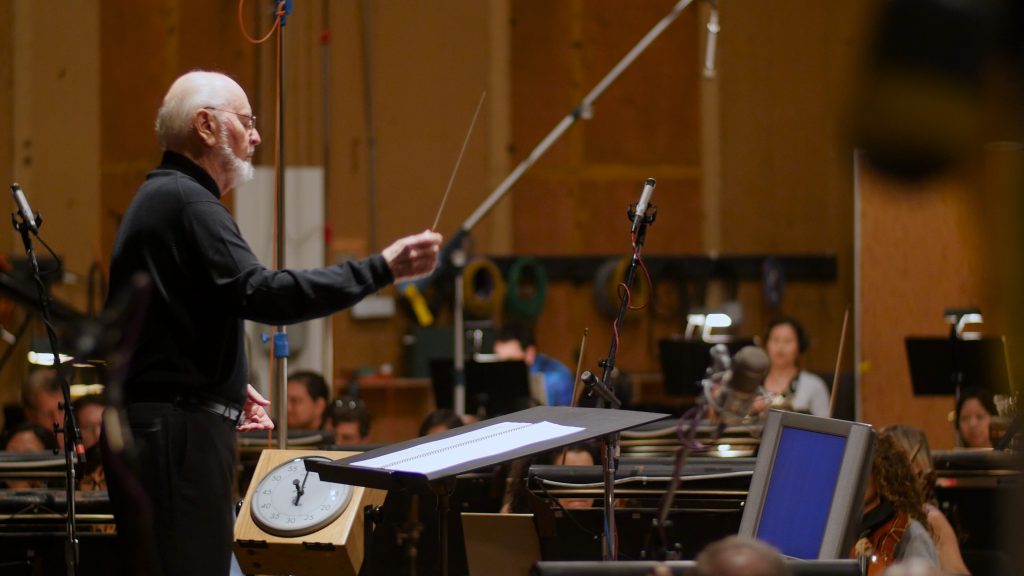
Music by John Williams is an Oscar-worthy documentary honoring the legendary maestro whose film scores have brought joy to generations.
I’ve been looking forward to watching this documentary since it was first announced. To say that it lived up to my expectations is not an understatement. It’s everything I wanted and more. Williams has had such a legendary career that 96 minutes isn’t enough to fully give his music its due but filmmaker Laurent Bouzereau comes as close as possible. Obviously, a few select films get the most attention and rightfully so. But hey, we’re talking about a composer with 54 Oscar nominations so crafting this film was never going to be an easy feat by any means. If there’s anyone with the credentials, it’s Laurent Bouzearau–he’s the man behind so many of the making-of documentaries for Steven Spielberg’s movies.
“But he’s more than just a composer,” says George Lucas. “He’s just a brilliant guy who really understands the relationship between pictures and sound.”
“John’s music connects with his audience on such a primal level,” says Seth MacFarlane. “It seems like these themes have been with us forever. At one point, he sat down and figured them out and now they’re just a part of our collective psyches.”
Williams adored his long-term collaborator Steven Spielberg from the beginning.
“Within five minutes, I realized that from a historical point of view, he knew more about film music than I did,” the maestro says.
In composing The Sugarland Express, Williams brought the film to place where Spielberg couldn’t even imagine. Spielberg decided then and there that Williams would compose all of his movies. With rare exceptions, this has been the case for the past 50 years and change. Spielberg grew up with film scores–in his first meeting with the maestro, he had hummed the opening score of Spartacus. Interestingly enough, he fell in love with The Reivers score when he first heard it, saying he would ask the composer to score his first film. What a wild ride it has been!

In as much as this is a film about the work of John Williams, it is also about his life. He grew up playing both baseball and piano. While listening to the radio, he would study instrumentation, later paying more attention to movies and scores while in high school. Williams started orchestrating during high school–this would lead to his earliest jobs in Hollywood. Beginning in 1951, Williams entered the U.S. Air Force and also joined the U.S. Air Force Band. It was during his service time that he would compose his first professional score for a travelogue documentary. His time as a jazz pianist would no doubt inspire his score for the Mos Eisley Cantina Band. After serving the country, he started working as a studio pianist and session musician. Williams would begin transitioning to composing as he found he could make more money than playing in a studio orchestra.
In working on one-hour anthologies, Williams could experiment with scoring for different genres. This would prove to be beneficial for his later career. A few of the TV series–including Lost in Space–were created by Irwin Allen, who would later hire Williams to score a pair of disaster thrillers, The Poseidon Adventure and The Towering Inferno. Williams also scored Earthquake. But before he scored the disaster thrillers, he took home his first Oscar for one of the best musicals ever made, Fiddler on the Roof. There is not as much of a focus on Fiddler on the Roof but if you want more insight, check out the bonus feature on the film’s Blu-ray release. Williams’s collaborations with George Lucas and Steven Spielberg get the biggest focus but that’s to be expected.
His life isn’t without adversity. His first wife, Barbara Ruick, died of an aneurysm at 41 years old. They had three teenagers at the time of her death. While Williams didn’t work for a while, a pair of filmmakers, Steven Spielberg and George Lucas, came along. Nobody could have ever predicted just how much his life would change by collaborating with them.
I’ve interviewed a number of composers over the years. While I usually ask them about their preferred studios because of the sound, I never think to ask them about temp tracks. Oscar-nominated composer Thomas Newman–son of the legendary Alfred Newman–mentions how creative doors end up closing upon listening to these tracks. Newman, like his older brother David, have had the opportunity to watch the maestro at work. To be a fly on that wall! But speaking of temp tracks, Spielberg approached Jaws with his own idea for the score. Williams had his own ideas and the rest is history.
After its theatrical release in 1977, the double-disc Star Wars soundtrack album would become a bestseller. The themes are just as iconic now as they were becoming back in 1977.
“Nobody had any idea that it would be the kind of hit, beyond a hit, it was a phenomenon,” says Williams. “It’s become–it’s still with us.”
How do contemporary filmmakers feel about the Star Wars score?
“That’s part of the audaciousness of the original Star Wars score,” says James Mangold, who worked with Williams on Indiana Jones and the Dial of Destiny. “That loud anthem opening–the most famous opening probably in movie history and music is a tribute to the power of orchestra.”
“The feeling was that it was so important, so epic in scope and scale, that it transports you to a different place,” offers J.J. Abrams, director of Star Wars: The Force Awakens and Star Wars: The Rise of Skywalker.
Fellow composer David Newman–Thomas’s older brother–says that he cannot think of anything in film music like Star Wars. There are so many themes–Williams composed some 80-90 themes over the course of the franchise. He came back a few years after Star Wars: The Rise of Skywalker to compose the theme for Obi-Wan Kenobi on Disney+.
“I truly believe that the soundtrack is half of the movie,” George Lucas says of the 1977 film. “Star Wars would not be Star Wars without Johnny Williams’s music.”
In 1977 alone, Williams scored Star Wars, Close Encounters of the Third Kind, and Black Sunday. These are three very different films requiring very different scores. Williams went straight into the Spielberg film after wrapping up his work on Star Wars. As such, his experience was very different from everyone else who worked on the film.
As if Star Wars and Steven Spielberg films–the film gets in-depth as much as is possible for a 96-minute film–are not enough, he also dabbled in a film called Superman. Williams notes that he could not wait to get his hands on the love them between Superman and Lois Lane.
“I owe a tremendous debt of gratitude to John Williams,” Christopher Reeve said at a 1993 Boston Pops Orchestra season-opening John Williams Gala Celebration. “Without his music, Superman’s powers are greatly diminished. Believe me, if you try to fly without that theme, you go nowhere. One step, two steps, and (whistles while pointing) down.”

The Indiana Jones films get a few minutes in the film. Kathleen Kennedy notes that Williams has so much fun writing themes for Harrison Ford. Spielberg describes the Raiders of the Lost Ark music as “pulse-pounding.” Frank Marshall mentions that Williams was always over at their house–Frank’s father, Jack Marshall, and Williams were in the Army band together. Anyway, Williams always brings back our favorite themes in composing the sequels while finding new ways in musically telling the story. One of the new themes for Indiana Jones and the Temple of Doom was for Ke Huy Quan’s Short Round–in as much as it was a magical moment seeing the Oscars reunion with Harrison Ford, it was equally magical to see the actor reunite with Spielberg and Williams.
E.T. the Extra-Terrestrial. Jurassic Park. Schindler’s List. Saving Private Ryan. Lincoln. The list goes on and on. Funny enough, I knew it was the Jurassic Park theme as soon as I heard the first note. It speaks to how often I watch the film, let alone listen to the soundtrack while flying. There’s a good chance that I listened to the soundtrack this past week. When John Williams first watched Schindler’s List, there was no temp music. Spielberg–who missed the Jurassic Park recording session because of filming in Europe–focused exclusively on the storytelling. Williams would win an Oscar for his score but told Spielberg at the time that he’d need to find a better composer. “All the better composers are dead,” Spielberg recalled saying at last year’s American Cinematheque conversation.
Spielberg’s wife, Kate Capshaw, will never forget her experience of watching Williams start playing on the piano. As for the filmmaker himself, he was emotionally devastated. “It was a mitzvah,” Spielberg says. “He honored the story of the Shoah through music.”
As for Saving Private Ryan and Lincoln, they offer the most American themes, evoking this sense of patriotism. It’s no wonder that “Hymn to the Fallen” is the most requested score by the military. To this date, the track remains a perfect tribute to American veterans.
While other composers have adapted to the changes in technology through the years, Williams is still old-fashioned. He’s never stopped to learn the electronic system. As many iconic scores and themes as he’s given us through the years, imagine how many more he’d have if he would have changed the way he works?!? We’re talking about a guy who is basically The Beatles of film composing–except he’s a singular person. Any single one of his themes, as someone mentions in the film, would be the greatest hit for any other composer. This is the beauty of Williams’s genius.
The film also explores his time as conductor of the Boston Pops Orchestra. Williams briefly resigned during his stint, only to come back a few weeks later. At the time of his appointment, orchestras hated playing film music. I mean, they HATED playing film music. They eventually came around but as Alan Silvestri says, Williams erased the dividing line in music. Williams kept the gig until 1993–current conductor Keith Lockhart replaced him in 1995. Speaking of orchestras playing film music, we see Williams take the conductor’s stand during his 2023 concerts at the Hollywood Bowl with the LA Philharmonic. These are concerts that would almost certainly not be happening without Star Wars becoming so iconic.
I can say so much more about this film. The filmmaking team saves a few iconic scores for the end credits. The depth of Williams’s work speaks for itself–you could choose any two or three themes and still second guess the decision. I think they work rather well in this instance–it’s John Williams so I’m sure people will watch to the very end. It should always be the case when listening to music by John Williams.
Music by John Williams is a great way to learn more about the composer or better yet, serve as an introduction to a new generation of fans. G-d only knows that my childhood would not be the same without John Williams.
DIRECTOR: Laurent Bouzereau
FEATURING: John Williams, Steven Spielberg, J.J. Abrams, Emmanuel Ax, Kate Capshaw, Chris Columbus, Gustavo Dudamel, Ethan Gruska, Javier C. Hernández, Paul Hirsch, Ron Howard, Thomas Hooten, Sgt. Karen Johnson, Lawrence Kasdan, Kathleen Kennedy, George Lucas, Yo-Yo Ma, Seth MacFarlane, James Mangold, Branford Marsalis, Frank Marshall, Chris Martin, Elvis Mitchell, Anne-Sophie Mutter, David Newman, Thomas Newman, Itzhak Perlman, Ke Huy Quan, Alex Ross, Alan Silvestri, Helen Wargelin, Jenny Williams
Music by John Williams premiered during AFI Fest 2024 as a Red Carpet premiere. In addition to a limited theatrical release, Disney+ will start streaming the film on November 1, 2024. Grade: 5/5
Please subscribe to Dugout Dirt and Solzy on Buttondown.




